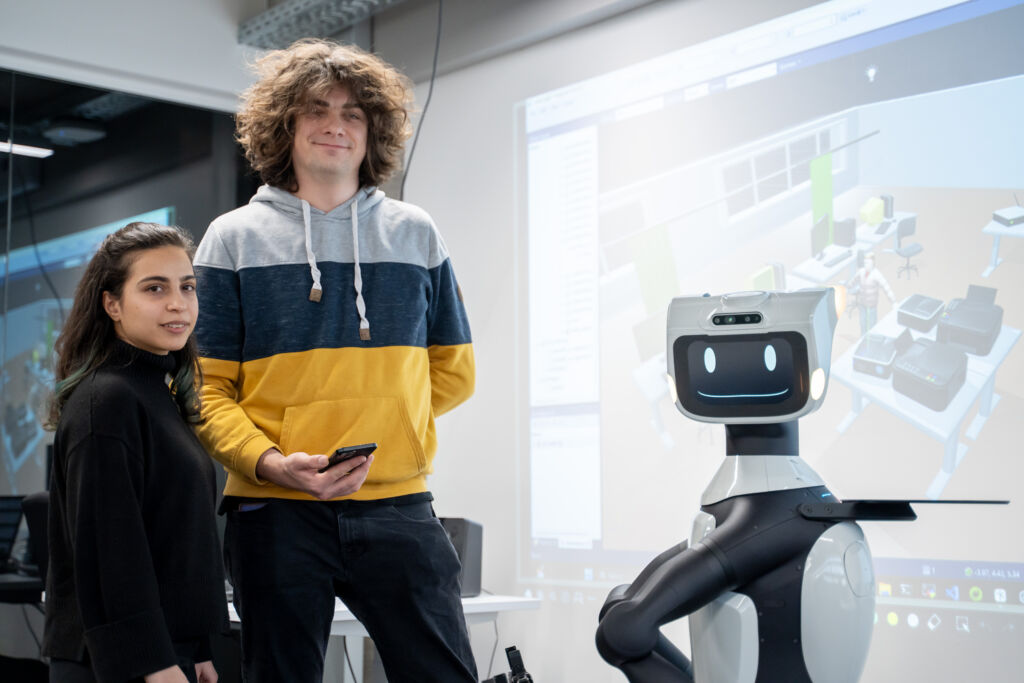IT:U launches its first Master Program
IT:U is launching its first Master Program “Interdisciplinary Computing” this autumn, sending a strong signal of its commitment to interdisciplinary higher education.
Starting in October 2025, IT:U Interdisciplinary Transformation University Austria, will offer its first interdisciplinary Master Program “Interdisciplinary Computing”. It is aimed at Bachelor’s graduates from all disciplines and combines computer science with a variety of disciplines. Thinking beyond the boundaries of one’s own discipline, using and further developing digital technologies and the tools of artificial intelligence to work on important problems of our time – the new Master Program at IT:U combines these requirements. The application process open 7 February 2025.
IT:U is the new technical university for digital transformation in Linz, focusing on interdisciplinary research and teaching. With its first Master Program, IT:U puts its claim for interdisciplinary higher education in a nutshell. Bachelor’s graduates from all disciplines can complete their Master’s degree at IT:U. They should have a keen interest in data-driven approaches and artificial intelligence – with the aim of helping to shape the future.
“We are setting new standards in academic education with our Master Program. We don’t start by teaching specialized knowledge and then applying it. At IT:U, the problem – such as those from industry – takes center stage. It forms the core of the project-based, personalised learning model. Students study in small groups – with an interdisciplinary composition. Using the methods of digital transformation, we work on solutions for the future.“.
Stefanie Lindstaedt, IT:U Founding President.
Developing digital solutions together in Learn Labs.
So-called Learn Labs form the basis: In the first two semesters of the Master Program, students learn about a wide range of digital technologies such as virtual reality, motion capture, artificial intelligence and robotics. They are given a “box of methods and tools” to help them navigate their way through their studies, accompanied by a Learn Coach. Specialist knowledge and so-called 21st century skills are supplemented in learning modules by professors and international lecturers. The novelty at IT:U is that individual skills are taken into account and are decisive for the scope of the necessary additional qualifications.
There are four specialisations to choose from.
The first four specialisations, which are offered under the umbrella of “Interdisciplinary Computing”, not only concern relevant areas of our lives, but also different industry branches and economic sectors:
- Designing Interactions: Students learn to understand and design interactions between people and digital technology in various social contexts such as mobility, education, or care.
- Digital Earth, Society, and Networks: Students engage with understanding social and geographical processes, such as disaster management, epidemics, etc., by analysing digital data, e.g., from social networks, using AI.
- Digital Humanities, Health, and Life Sciences: Combines interdisciplinary approaches from the digital humanities and life sciences. Students are empowered to use modern technologies and data analysis methods to solve complex challenges in healthcare and biomedical research.
- Future Industries: Focuses on developing skills in sustainable computer-aided manufacturing, robotics, Internet-of-Things and innovative technologies, including the design of safety-critical systems and industrial applications.
This specialisation addresses “real world challenges” and combines the knowledge from the Learn Labs to develop solutions.
Shaping the life of tomorrow with projects.
Project-based and personalised learning encourages students to think and work together in an interdisciplinary way. One concrete example is the investigation of the potential applications of artificial intelligence in care. This involves researching how digital technologies can support human care and self-determination in old age. Another possibility is the development of AI-based models for environmental systems to minimise the impact of natural disasters through more precise predictions.
“The digital transformation requires not only technical knowledge, but also a deep understanding of the social, ethical and interdisciplinary aspects that will shape our future. With this Master Program in Interdisciplinary Computing, we want to meet this demand.“.
Stefanie Lindstaedt.
Shaping the future as a digital transformer.
IT:U qualifies digital transformers who combine the expertise of their specialist discipline with the latest digital technologies of artificial intelligence and data analysis to develop new solution models. These experts are needed to implement the solution and development potential of digitalisation in industry and research.
The Master Program “Interdisciplinary Computing” at a glance:
